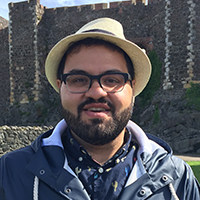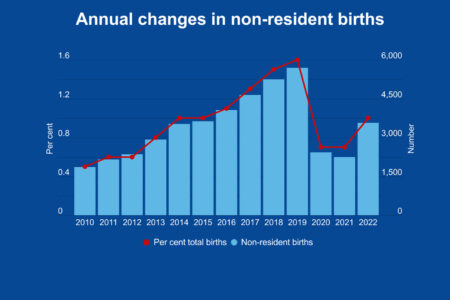
The first ISIL recruit I interviewed, in 2014 in Delft, the Netherlands, was a 22-year-old woman who had become an ISIL bride after being indoctrinated by a recruiter. It took the recruiter two months of continuous communication online to convince her to join what he called “the cause” and to be “part of the global struggle against the atrocities of the West.”
After months of clandestine planning, Zoleikha (not her real name) cautiously set out for the airport, ready to step aboard a flight to Iraq. She had followed every detail of the recruiter’s guidance except one: She left a short note to her family, telling them of her decision.
The family had suspected something was up. Zoleikha had been evasive for a while, and they had got in the routine of searching her room for clues when she was out of the house. When her father found the note, his heart skipped a beat and he could barely breathe. He knew what he had to do. Not more than an hour went by before the authorities stopped Zoleikha as she was about to board the plane.
I spoke with her father, a man of Moroccan descent, who owned the local dry-cleaning business. He was a hard-working family man. Of his four children, one was in high school and three had graduated from college, including Zoleikha. He had built a new life for his family and hoped his children would prosper.
He and his family followed some cultural traditions and occasionally attended mosque services. But it was important to him that his children assimilate into European culture. When he found the note, he remembered an Imam who had spoken about the challenges of radicalization and the need to be vigilant about recruiters within their community. The Imam had encouraged partnership with the local government and trust of the authorities.
Out of desperation, the father called the authorities. He told me he had done it for his daughter’s sake and for the sake of the country that had given him a new beginning. Zoleikha never reached Iraq. She was arrested, and then she was lucky enough to be released conditionally under court supervision.
There are many women who were not fortunate enough to have such an intervention. By most estimates, approximately 5,000 European citizens have been recruited to Iraq and Syria by ISIL since 2013. Many of the women left family, freedom and fortune to pursue an uncertain future. They arrived in Syria and Iraq, and what happened to them after that is a mystery. However, now, with the demise of the Islamic State, they are contemplating returning to the countries they left behind.
In Europe, conversations about the fate of returnees have intensified since the UK Home Office decided to strip British citizenship from Shamima Begum — who joined ISIL at 15 along with two other schoolgirls from the UK. The question for us as a society is: What do we do in these cases? Is appropriate to indiscriminately strip members of such a heterogeneous group of citizenship?
Debate has focused on legal questions that surround such a move, which would cause the troublesome dilemma of creating stateless individuals. However, human rights and counter-terrorism strategies deserve more consideration than they have gotten.
There are three main factors to consider in the complex matter of ISIL recruits who want to come home.
Why they left their home country
The first step is figuring out whether those who joined ISIL qualify as foreign terrorist fighters or whether they just went along for the ride. Some of the recruits have carried out unspeakable acts, but there are others who have supported ISIL through nonviolent means (as jihadi brides) or were forced to go along (wives and children).
It is vital to understand the spectrum of active participation to passive victimhood, as it has become clear that some of the women have suffered repeated traumas while having little willful participation in ISIL activities. Of course, few cases are likely to fall at the extremes of the spectrum. The majority of returnees likely will fall somewhere in the middle.
We need to approach the way we deal with these returnees across a spectrum. At one end of the spectrum we can imagine rare instances where an individual would be welcomed home without retribution and would re-enter society. There might also be exceptional instances where revoking citizenship and/or meting out the harshest punishments is appropriate. A case-by-case approach would help in the determination of what is a proportional response and appropriateness of criminal investigations.
How vulnerable to coercion were they?
The global terrorism database suggests that a leading factor in the ultimate decision to pursue a life of terrorism is a sense of societal alienation. This can be particularly heightened in young people whose sense of self is still developing and who suffer from self-estrangement. My field work shows that those who have sought to join ISIL from Western countries are not poor or uneducated, although poverty and lack of education are typically possible factors leading to vulnerability.
Alienation has been described as a leading driver, particularly among second-generation immigrants. Those who experience feelings of alienation seek empowerment, identity and a purpose often in misguided ways. Counselling can help with identity crisis, however, youths can fall into recruiters’ traps of before any such help arrives. This is not to release all blame and culpability for unforgivable actions. But many of the young women who were coaxed into joining the cause with a promise of identity and empowerment were subject to further alienation and subjugation. A person whose vulnerabilities have been exploited is quite different from one who knowingly and purposefully seeks out “the cause.”
The circumstances of their return
No country wants to threaten the security of its citizens by welcoming with open arms anyone who has been radicalized and continues to hold on to a jihadi mission. However, not all of those who wish to return are still aligned with “the cause.” Some returnees admit that they lived through nightmare experiences that were nothing like what they had been promised. And now they feel regret and remorse.
Policy-makers and academics can work with former recruits and terrorists and tell their stories in compelling ways so that others can learn why they started on a terrorist trajectory and see how it did not work out. They can shed light on the coercive tactics used by recruiters and ultimately help to devise counter-terrorism strategies that are not reactive but rather preventative.
In the world of securitization and advanced terrorism studies, the goal of counter-terrorism is to prevent attacks. Populist extrajudicial rulings against returnees, for example stripping them of their citizenship, could weaken and drastically derail these long-term prevention efforts by deepening society’s divisions. They could also create a perfect breeding ground for further radicalism. By allowing people who joined ISIL back into their home countries and putting them on trial, we can reduce such risks and furthermore create societal benefits.
As Fiona de Londras shows, upholding human rights and the rule of law does not hamper our ability to act. It enhances it, and is essential to the long-term success of counter-terrorism efforts.
Of course, until the police and courts determine whether and to what degree the returnees are culpable, returnees should be put in some sort of penitentiary facilities. If the courts find them guilty, they have to be sentenced for their crimes. If the courts and the police agree that they do not pose a substantial danger (be it through radicalization of others or inflicting violence), returnees should enter into a reintegration program that will help them re-establish familial and community ties. These returnees need help to find ways to participate in society and to address the alienation they might have experienced. Reintegration is important in the long term to reduce the risk of radicalization – both for the individual and for society. It fosters belonging, which is something the politics of fear cannot do.
These returnees might well serve as the best source of data. In counter-terrorism studies, field research is very limited. Because of security and access restrictions researchers often depend on incomplete secondary accounts and analysis. Working with returnees would allow us to better align counter-terrorism measures with the forces that activate terrorism, thereby achieving the goal of deterrence and perhaps prevention.
Disillusionment and disengagement in returnees can serve as cautionary tales for others by illustrating the false realities of joining such a mission. Stripping citizenship and other arbitrary punishments only support the extremist belief that the West does not care about the rest (i.e., Muslim citizens), leading to further escalation by pushing marginalized individuals and communities farther away from mainstream society. Such acts breed mistrust, making it less likely that marginalized groups will approach authorities when there is a problem of any kind.
“Why did you want to join ISIL?” I asked Zoleikha. She looked conflicted. “What could be greater than being part of building a new state?” she responded. She still seemed to be grappling with her identity.
Her father was relieved that he had been able to stop her before it was too late. And if she had been stripped of her citizenship? Perhaps it would make the next scenario where a father discovers his daughter about to join ISIL a different one. Perhaps that father would not do what Zoleikha’s father did: Report her to authorities, which prevented her from joining ISIL.
Photo: Demonstrators chant in favour of al-Qaida-inspired Islamic State of Iraq and the Levant (ISIL) in June 2014 as they carry al-Qaida flags in front of the provincial government headquarters in Mosul, 360 kilometres northwest of Baghdad, Iraq (Associated Press).
Do you have something to say about the article you just read? Be part of the Policy Options discussion, and send in your own submission. Here is a link on how to do it. | Souhaitez-vous réagir à cet article ? Joignez-vous aux débats d’Options politiques et soumettez-nous votre texte en suivant ces directives.









